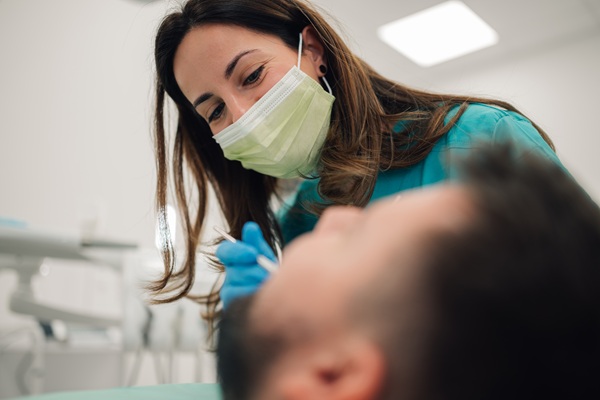Will a TMJ Disorder Go Away on Its Own?

The joint holding the jaw to the skull is called the temporomandibular joint, or TMJ. It is a complex system of bones, muscles, and tendons that must work in sync to ensure the jaw can move and function properly. When one of the components has a problem, it may turn into a TMJ disorder that restricts jaw functions and causes pain, jaw locking and clicking, as well as abnormal popping. TMJ disorders often have an underlying cause, and unless the issue is treated, the disorder will most likely not go away without professional treatment.
Why TMJ treatment is necessary
Although TMJ disorder is not a life-threatening condition, it can have a negative impact on someone’s life if left untreated. The disorder may cause the following symoptims:
- Headaches or migraines
- Chronic jaw pain
- Ringing in the ears (tenatus)
- Problems when chewing or biting
- Locked (stuck) jaw
The longer the patient waits before seeking treatment, the worse the problem gets. Recurrent pain from TMJ disorder can disrupt sleep, restrict the consumption of certain foods, and affect job performance and quality of life. Instead of bearing the discomfort while waiting for the disorder to disappear on its own, patients can visit the dentist for TMJ treatment.
Treatments for TMJ disorders
Patients who are experiencing TMJ symptoms need to talk to their dentist or an oral surgeon for evaluation, diagnosis, and treatment. These dental professionals have a deep understanding of the structures making up the jaw and are well-placed to detect the underlying cause of the TMJ disorder. At the first appointment, patients can expect to undergo a visual examination of their jaw and get an X-ray scan. The dentist will use the information obtained during the evaluation to develop a treatment plan.
Treatments for TMJ disorder usually start conservatively, including procedures such as massage and physical therapy. Physical therapy or massage for strained jaw muscles may be effective for treating patients with TMJ problems. Sometimes, stress could be a major contributing factor in the case of TMJ disorder. If the dental professional thinks stress is worsening the symptoms, they may recommend seeing a therapist for stress management techniques.
Bruxism, also known as teeth grinding, can also worsen TMJ disorder and cause pain due to the excess strain it induces on the jaw. Patients who grind their teeth may be able to relieve symptoms of TMJ disorder by wearing a custom mouthguard designed to stop teeth grinding.
If less invasive methods fail to improve TMJ symptoms, the dentist may recommend a surgical procedure as a last resort. The dentist may discover a structural impairment in the jaw that is responsible for the disorder, and surgery might be necessary to correct the problem. Otherwise, most of the treatment options for TMJ are usually performed on an outpatient basis without disrupting the patient’s routine.
Get the relief you need from TMJ disorders
TMJ disorders will probably not go away on their own. If you are experiencing the above symptoms, the Joseph A. Savoini D.M.D., P.C. is here to help. Call our Prescott to learn more or to schedule a consultation.
Request an appointment here: https://familydentistprescott.com or call Joseph A. Savoini D.M.D., P.C. at (928) 297-3040 for an appointment in our Prescott office.
Check out what others are saying about our dental services on Yelp: TMJ Dentist in Prescott, AZ.
Recent Posts
TMJ disorder can cause an immense amount of pain and serious dysfunction in the jaw and facial region. It is necessary to see a general dentist for TMJ disorder treatment options. General dentists undergo extensive training that prepares them to properly diagnose and treat TMJ. Thinking only a medical professional can treat TMJ? In fact, dental…
TMJ disorder is an issue that affects many Americans each year. It leads to jaw pain, limited jaw movement and other symptoms. Dentists can diagnose, treat and prevent TMJ disorder through a variety of methods. It is helpful to understand how the diagnostic and treatment process works for TMJ to determine if you should visit…
Teeth whitening helps many adults lift everyday stains while keeping appointments simple and predictable. At-home trays use dentist-recommended gel and a snug fit to gradually brighten enamel, supporting comfort and consistency. This approach fits busy routines, allows adjustments along the way, and encourages long-term shade maintenance with periodic touch-ups after professional cleanings.Teeth whitening gel contains…
A preventive dentist focuses on stopping problems before they start. By pairing routine checkups with good daily habits, patients protect enamel, gums, and long-term oral function. Seeing a preventive dentist helps catch early signs of decay or gum inflammation, guide at-home care, and plan simple treatments that preserve natural tooth structure. Preventive care also supports…


